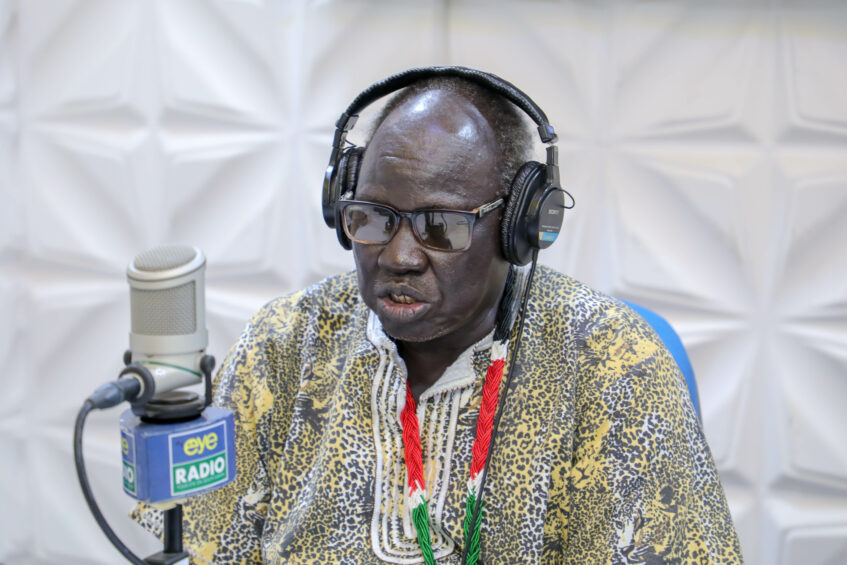
Minister of Livestock and Fisheries, Onyoti Adigo speaking to Eye Radio's Sundown Program. |31st May 2022| Credit: Lou Nelson.
The Minister of Livestock and Fisheries has warned of serious measures against individuals allegedly smuggling livestock and fish across the borders.
Onyoti Adigo Nyikwech said he has realized that some local and foreign dealers smuggle animals, fish and their products at night in order to escape government taxation.
“Fish is being exported to most of the Countries and the government is not benefiting from it, it is just going outside South Sudan and being smuggled. The same thing with skin and hide, you know skin and hide is very important also,” Adigo said.
He told Eye Radio’s Sundown Program yesterday, that the government will to regulate dishonest traders indulged in the cross border smuggling.
“They are being smuggled outside and we have known that when they put these things on the truck, the big trucks, they put it by twelve o’clock or one o’clock by night and then smuggle these things actually, so we want to regulate these things, if you want it, you are free to take it by day time provided that you have permission,” he said.
Last week, Minister Adigo issued an order for the regulation and management of all livestock, fish and their products.
The ministerial order was intended to control and combat livestock and fish diseases, protect public health and curb smuggling.
Importers and exporters of livestock and fish, and their products are required to obtain several permits and certificates, including a letter of no objection from the ministry in order to process their work licenses.
The order also provided for the screening and certification of all animals to be imported or exported, and upon demand, the traders must produce the health certificate.
Livestock including cows, horses, goats, sheep, pigs and poultry as well as their related products will all be regulated in the form of taxation.
For every five heads of cattle imported or exported, the owner must obtain a health certificate and an import/export permit fee at a sum of 120 US dollars.
Meanwhile, Onyoti also disclosed that the intent of the government is to start quarantining imported livestock to deter disease infection.
“Somebody bringing cattle into South Sudan should have the letter of origin, the Country of origin with heath certificates which is there and when they enter South Sudan also,
“We will try to quarantine them, put them in quarantine for at least fourteen days so that we see exactly these cattle free from diseases because we don’t want our cattle to be mixed with disease coming from outside,” Adigo instructed.
He encouraged the private sectors to consider obtaining a letter of origin and health certificates to verify the status of the livestock.
South Sudan is said to have one of the largest livestock population in Africa.
The country’s livestock population is estimated at 12 million cattle, 20 million sheep and 25 million goats according to the National Ministry of Livestock and Fisheries Industry, making it a world leader in terms of animal wealth per capita.
However, reports have shown that livestock in the country do not receive sufficient attention in government policies and financing in spite of their importance to the national economy.
Almost all animals in the country are said to be owned by smallholder farmers or traditional pastoralists, and that livestock are affected by a multitude of diseases while receiving only a negligible care.
Support Eye Radio, the first independent radio broadcaster of news, information & entertainment in South Sudan.
Make a monthly or a one off contribution.
Copyright 2024. All rights reserved. Eye Radio is a product of Eye Media Limited.